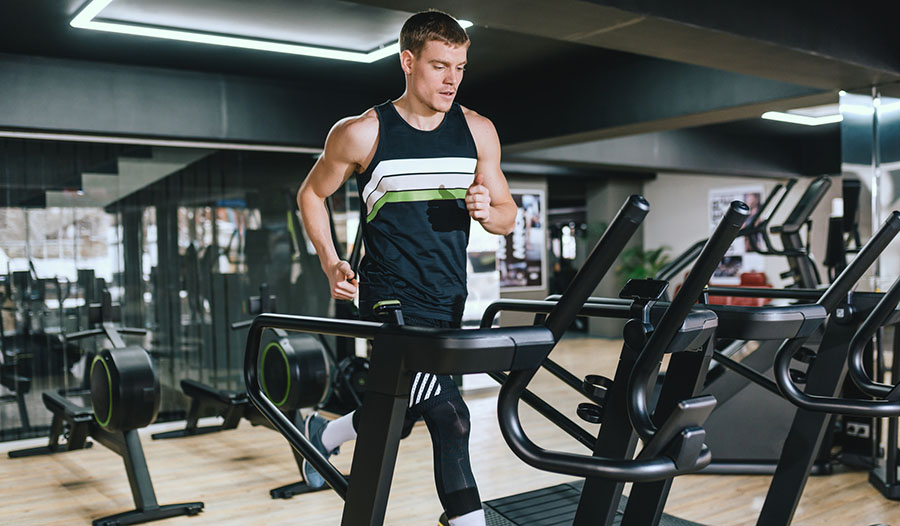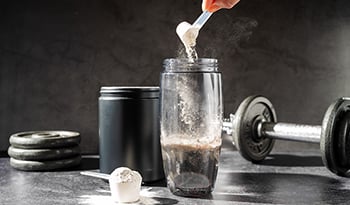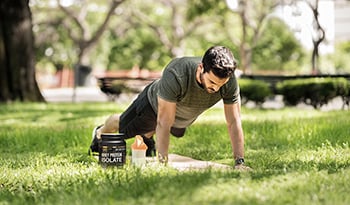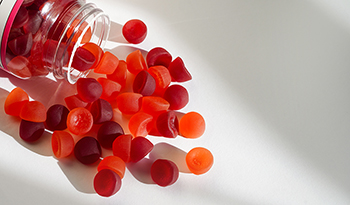Maximize Your Next HIIT Workout

High-intensity interval training (HIIT) is a workout structure that requires the body to work incredibly hard for short periods of time. Over the last few years, HIIT workouts have surged in popularity due to their effectiveness and their short work durations. HIIT workouts can be fantastic tools for fat loss, improving cardiovascular health, and overall wellness.
It’s important to recognize that while these workouts hold plenty of benefits, they also come with drawbacks when not structured properly, and this is especially true for beginners. HIIT workouts are highly demanding on the body, so they should be performed with a slightly more conservative mindset. Ample attention should be given to recovery and fueling the body properly.
How to Fuel the Body for a HIIT Workout
If you perform HIIT workouts on a regular basis, then you need to fuel your body and recover properly.
Pre-Workout
HIIT workouts are intense in nature and can be tough to get through at times when energy is low. Pre-workout supplements can be useful tools to boost performance, but use them wisely, only when they’re truly needed, and not as a crutch.
Pre-workouts will best serve performance when physical and mental energy levels are very low. They should be avoided on days that you feel great and have high energy, as you don’t want to become reliant on an external source of energy to push through tough workouts.
Intra-Workout
Another useful training tool can come in the form of intra-workout supplements. Oftentimes, glycogen (our body’s preferred energy source) gets depleted during HIIT workouts, so intra-workout supplements can be useful to refuel the body. Consider them your pit crew for performance and maintenance.
Post-Workout
The final tools that can be useful to promote HIIT workout performance are fast-digesting carbs and protein post-workout. After a HIIT workout, glycogen levels will be low, so consuming a quick-digesting carb with electrolytes is a great way to replenish energy stores and minerals lost through sweat.
Protein is also a useful tool because it typically digests quickly and contains minimal fat (which can slow digestion) and a plethora of branched-chain amino acids, also known as BCAAs, for recovery. You can easily consume protein in a shake and add fruit and foods like granola to it for additional carbs as well.
HIIT Treadmill Workout
One of the best and most common ways to regularly perform HIIT workouts is on a treadmill. But before diving into a treadmill workout, it’s important to understand that training intensity is always relative to experience. For most, it’s often best to structure HIIT workouts with a 1:3 work-to-rest ratio, so if you run 30 seconds, then you rest for 90 seconds before starting the next bout. For advanced training populations, the work-to-rest ratio can be shortened to 1:2.
The workout below offers two levels of intensity for both beginners and veterans to HIIT treadmill training. One way to track treadmill HIIT workout progress is by finding your maximum heart rate, then creating a goal heart rate based on the intensity you choose.
Step 1: Find Your Maximum Heart Rate
220 – Your Age = Maximum Heart Rate
Step 2: Choose Your Training Intensity
Beginners: Maximum Heart Rate x .70 = Goal Workout Heart Rate
Experienced: Maximum Heart Rate x .90 = Goal Workout Heart Rate
Step 3: Plug In Your Numbers
Now that you’ve found your maximum heart rate and adjusted your training intensity, it’s time to plug those numbers into the HIIT treadmill workout. For the sprint portion of the workout, you’ll want to reach the goal heart rate that you figured out in the training intensity section.
- Round 1: 15-second sprint: 45-second walk
- Round 2: 20-second sprint: 60-second walk
- Round 3: 25-second sprint: 75-second walk
- Round 4: 30-second sprint: 90-second jog
- Round 5: 25-second sprint: 75-second jog
- Round 6: 20-second sprint: 60-second jog
- Round 7: 15-second sprint: 45-second jog
- Round 8: 10-second sprint: 30-second jog
- Round 9: 20-second sprint: 60-second jog
- Round 10: 30-second sprint: 90-second jog
Total Sprint Time: 210 seconds (3:30)
This workout can be performed on its own or as a finisher to your normal workout. It’s relatively quick and can be modified based on your needs. Additionally, you can elevate the treadmill slightly to increase the toughness of this workout.
DISCLAIMER:This Wellness Hub does not intend to provide diagnosis...















































































 Table of Contents
Table of Contents
















